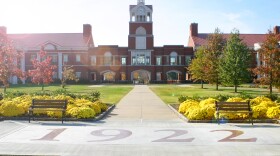A bill that would allow Murray State to establish Kentucky’s first veterinary school advanced out of the House Agriculture Committee Wednesday.
However, some lawmakers and industry experts raised concerns during the nearly two-hour meeting about the proposed school’s impact on the Commonwealth’s existing relationships with other veterinary programs, as well as the far western Kentucky school’s proposed educational model for its vet school.
House Bill 400 – sponsored by Republican State Rep. Richard Heath – would amend the existing state statute to allow Murray State to offer doctoral degrees required to become licensed in veterinary medicine.
Kentucky is one of more than 20 states without a veterinary school accredited by the American Veterinary Medical Association. But, the state does have contracts with Auburn University and Tuskegee University in Alabama to reserve around 40 seats between the two institutions’ veterinary programs for Kentucky residents each year.
Bob Jackson, the president of Murray State University, testified that launching an in-state veterinary school would help alleviate the shortage of veterinarians in the state, particularly when it comes to large-animal practitioners.
“It's a basic math problem. There's not enough slots or seats in the vet schools that exist today to meet the growing demand of veterinarians in this country and in the state,” he told lawmakers Wednesday.
MSU’s proposed vet school could admit up to 70 students per year, according to a feasibility study the university conducted in the fall.
Members of the Kentucky Veterinary Medical Association said that the group has not taken an official stance on the bill, but they did raise questions about the impact launching a veterinary program in Kentucky would have on the state’s existing relationships with other educational institutions.
Jim Weber, the group’s governmental relations chair, said Murray State’s proposed program could impact the number of seats saved for Kentucky residents at those longer-established programs at Auburn and Tuskegee.
“We have been made aware of opportunities to expand contract state space numbers at long established schools,” Weber said. “If Kentucky opens a veterinary school, we will very likely be giving up spaces, as these resources would be directed to an in-state school.”
Weber also said a focus on training veterinarians to primarily treat large animals leaves out practitioners that practice on both large and small animals.
A report from the Kentucky Board of Veterinary Examiners in Spring of 2022 found that fewer than 60 Kentucky resident veterinarians dedicate more than 70% of their time to treating large animals and livestock. However, a demographic report from 2023 found that 288 Kentucky veterinarians treat food animals as between 1% and 69% of their practice.
Weber said these “mixed animal practitioners” should not be left out of the equation when considering how to address shortages in large animal medical treatment.
“The economic reality is that in many rural areas of the state, a veterinary practice is economically viable only if a veterinarian sees all species of animals as patients,” Weber said.
Vet school education model
Brian Parr, the dean of Murray State’s Hutson School of Agriculture, outlined the basic blueprint for Murray State’s three-year veterinary program during the Wednesday committee meeting.
“Our vision is this curriculum that focuses on this clinical, distributed model of vet education, with the preclinical training there at our new proposed site at Murray State University,” Parr said. “Then the clinical year [third year of the program], partnering with existing practices and industry and nonprofits so that our students get that on the ground education.”
Murray State’s feasibility study found that the distributed education model, as opposed to the traditional on-campus model, would help keep costs down while also exposing students to industry-standard equipment and environments.
Tammy Smith, a veterinarian who practices in Knox County, said under that model students may not get equal experiences at different clinics, which could impact their education and preparedness for the workforce.
“There are some clinics that [students] go in, some sites they go in, they don't get much hands-on experience, they monitor or observe from across the room. Then there are some where it's kind of carte blanche, and they're allowed to do a lot of things without much supervision,” Smith said. “The vast difference, I think, is a gross disservice to the students. Some are coming out with a lot of experience, and some are coming out with none.”
When voting to move House Bill 400 out of committee, several lawmakers said they needed to evaluate the concerns raised during the meeting to determine how they would vote on the measure once it reaches the full House floor.
Democratic Rep. Chad Aull of Lexington abstained from voting on the measure.
“As someone who grew up in rural Kentucky who has large animals on my family farm, I'm very, very torn about the future in this industry. It's personal to my family,” he said. “I'm very concerned about the long term economic impacts of what we're going to do if we go down this road, and the conflict that will inevitably come up when we hit an economic recession. And we have to choose between continuing to fund a new veterinarian school at Murray State or continuing our 70-year relationship with Auburn.”
The vet school bill now moves to the full House for consideration.





